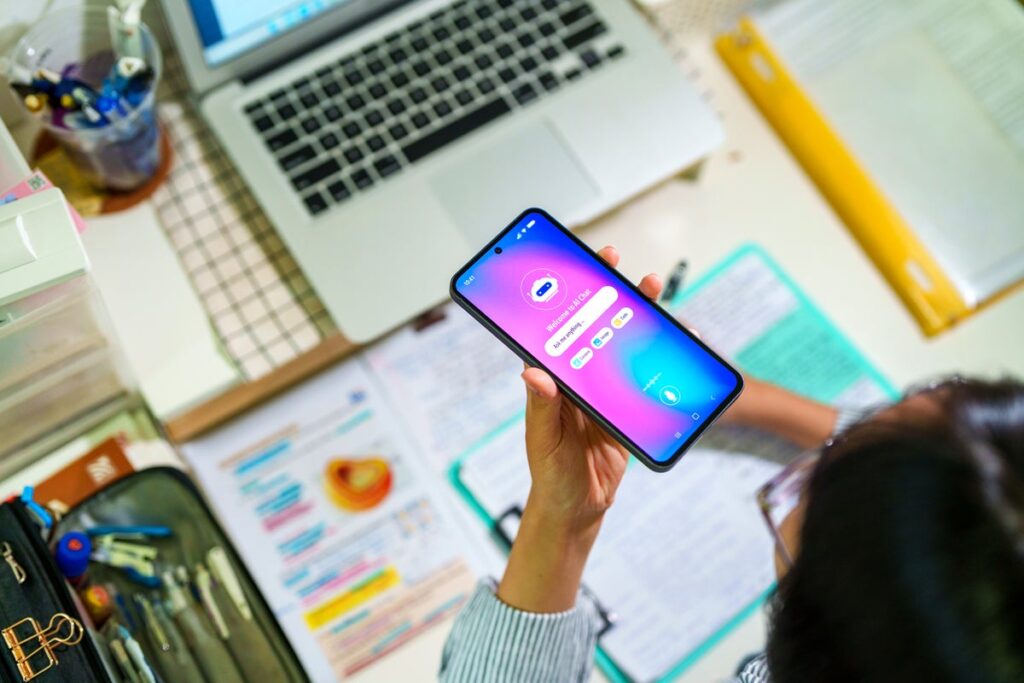Does Using ChatGPT Change Your Brain Activity? Study Sparks Debate
Scientists warn against reading too much into a small experiment about ChatGPT and brain activity that is receiving a lot of buzz
Thai Liang Lim/Getty Images
The brains of people writing an essay with ChatGPT are less engaged than those of people blocked from using any online tools for the task, a study finds. The investigation is part of a broader movement to assess whether artificial intelligence (AI) is making us cognitively lazy.
Computer scientist Nataliya Kosmyna at the MIT Media Lab in Cambridge, Massachusetts, and her colleagues measured brain-wave activity in university students as they wrote essays either using a chatbot or an Internet search tool, or without any Internet at all. Although the main result is unsurprising, some of the study’s findings are more intriguing: for instance, the team saw hints that relying on a chatbot for initial tasks might lead to relatively low levels of brain engagement even when the tool is later taken away.
Echoing some posts about the study on online platforms, Kosmyna is careful to say that the results shouldn’t be overinterpreted. This study cannot and did not show “dumbness in the brain, no stupidity, no brain on vacation,” Kosmyna laughs. It involved only a few dozen participants over a short time and cannot address whether habitual chatbot use reshapes our thinking in the long-term, or how the brain might respond during other AI-assisted tasks. “We don’t have any of these answers in this paper,” Kosmyna says. The work was posted ahead of peer review on the preprint server arXiv on 10 June.
On supporting science journalism
If you’re enjoying this article, consider supporting our award-winning journalism by subscribing. By purchasing a subscription you are helping to ensure the future of impactful stories about the discoveries and ideas shaping our world today.
Easy essays
Kosmyna’s team recruited 60 students, aged 18 to 39, from five universities around the city of Boston, Massachusetts. The researchers asked them to spend 20 minutes crafting a short essay answering questions, such as “should we always think before we speak?”, that appear on Scholastic Assessment Tests, or SATs.
The participants were divided into three groups: one used ChatGPT, powered by OpenAI’s large language model GPT-4o, as the sole source of information for their essays; another used Google to search for material (without any AI-assisted answers); and the third was forbidden to go online at all. In the end, 54 participants wrote essays answering three questions while in their assigned group, and then 18 were re-assigned to a new group to write a fourth essay, on one of the topics that they had tackled previously.
Each student wore a commercial electrode-covered cap, which collected electroencephalography (EEG) readings as they wrote. These headsets measure tiny voltage changes from brain activity and can show which broad regions of the brain are ‘talking’ to each other.
The students who wrote essays using only their brains showed the strongest, widest-ranging connectivity among brain regions, and had more activity going from the back of their brains to the front, decision-making area. They were also, unsurprisingly, better able to quote from their own essays when questioned by the researchers afterwards.
The Google group, by comparison, had stronger activations in areas known to be involved with visual processing and memory. And the chatbot group displayed the least brain connectivity during the task.
More brain connectivity isn’t necessarily good or bad, Kosmyna says. In general, more brain activity might be a sign that someone is engaging more deeply with a task, or it might be a sign of inefficiency in thinking, or an indication that the person is overwhelmed by ‘cognitive overload’.
Creativity lost?
Interestingly, when the participants who initially used ChatGPT for their essays switched to writing without any online tools, their brains ramped up connectivity — but not to the same level as in the participants who worked without the tools from the beginning.
“This evidence aligns with a worry that many creativity researchers have about AI — that overuse of AI, especially for idea generation, may lead to brains that are less well-practised in core mechanisms of creativity,” says Adam Green, co-founder of the Society for the Neuroscience of Creativity and a cognitive neuroscientist at Georgetown University in Washington DC.
But only 18 people were included in this last part of the study, Green notes, which adds uncertainty to the findings. He also says there could be other explanations for the observations: for instance, these students were rewriting an essay on a topic they had already tackled, and therefore the task might have drawn on cognitive resources that differed from those required when writing about a brand-new topic.
Confoundingly, the study also showed that switching to a chatbot to write an essay after previously composing it without any online tools boosted brain connectivity — the opposite, Green says, of what you might expect. This suggests it could be important to think about when AI tools are introduced to learners to enhance their experience, Kosmyna says. “The timing might be important.”
Many educational scholars are optimistic about the use of chatbots as effective, personalized tutors. Guido Makransky, an educational psychologist at the University of Copenhagen, says these tools work best when they guide students to ask reflective questions, rather than giving them answers.
“It’s an interesting paper, and I can see why it’s getting so much attention,” Makransky says. “But in the real world, students would and should interact with AI in a different way.”
This article is reproduced with permission and was first published on June 25, 2025.


